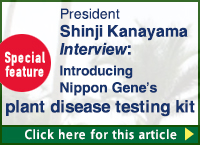Carrot
There are many carrot diseases in the world but some do not exist in Japan. For example, Ca. L. solanacearum is a phytopathogenic bacterium that is borne by the insects of Triozidae Trioza sp., but in recent years it has become clear that infection spread by seed transmission of carrot.
Quarantine inspection of imported carrot seeds is important to prevent entry into Japan.
Ca. L. solanacearum
- Bacteria that infect carrots, potatoes, etc. mediated by insects
- Infects carrot seeds
- Quarantine inspection essential to prevent entry into Japan
Ca. L. solanacearum is a phytopathogenic bacterium that is mediated by the insects of Triozidae Trioza sp.. It infects carrots, potatoes, solanaceous and celery plants, causing symptoms such as cigars and dwarfing. In recent years, it has been clarified that this bacterium is transmitted through seeds in carrots. Ca. L. solanacearum is an extremely disastrous phytopathogen that cause a lot of damage, such as a decline in quality and yield of infected crops.
Nippon Gene offers products using the Ca. L. solanacearum detection technology developed by the University of Tokyo Plant Hospital®.
Detection Kit
LAMP Primer Set for Ca. L. solanacearum Detection
A primer set for LAMP method that detects Candidatus Liberibacter solanacearum.
* The linked page may be in Japanese, please use the translation function of the browser.




